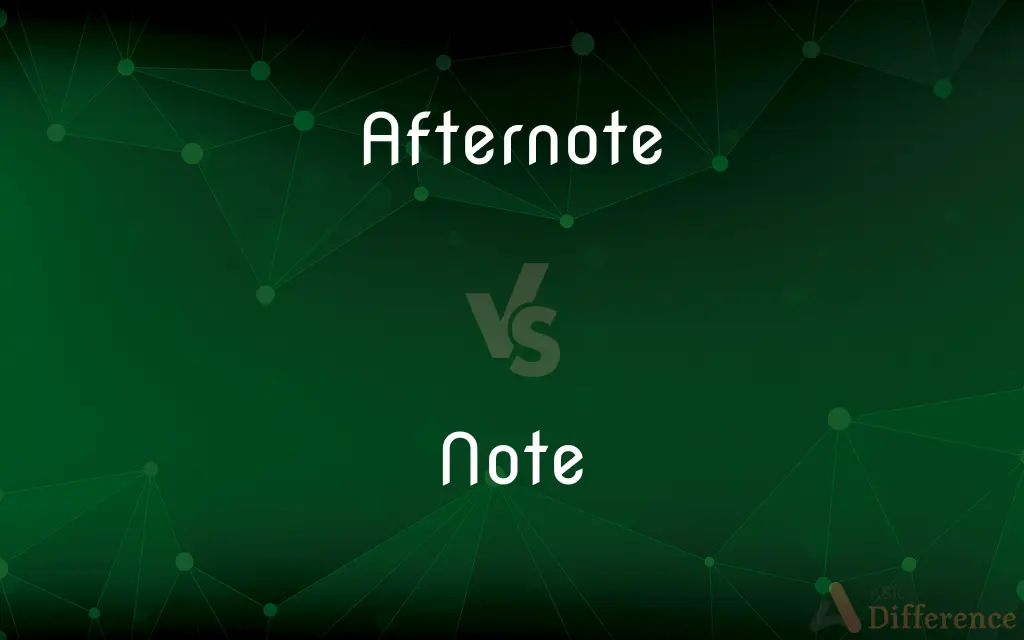Afternote vs. Note — What's the Difference?
By Maham Liaqat & Urooj Arif — Updated on April 29, 2024
Afternote is a supplementary addition often used to clarify or provide further details after a main text, whereas a note is a brief written reminder or piece of information used generally.

Difference Between Afternote and Note
Table of Contents
ADVERTISEMENT
Key Differences
An afternote is typically found at the end of a document or book, providing additional information or clarification related to the content discussed, whereas a note can be used anywhere within a text or as a standalone piece of information.
Afternotes are often used to elaborate on references, cite sources, or give extra context that complements the main text, while notes might serve to remind, inform, or annotate specific points for the reader or writer.
In academic or literary texts, afternotes help in deepening the understanding of the subject without interrupting the flow of the main content, whereas notes can be informal and used for personal memory aids or quick references.
Afternotes are structured and placed systematically at the end to maintain the integrity of the main text, whereas notes can be sporadic and vary in format, including post-its, digital memos, or marginalia in books.
The use of afternotes is particularly prevalent in scholarly articles and books to avoid the clutter of footnotes, while notes are ubiquitous in everyday use, from classrooms to boardrooms, for a variety of purposes.
ADVERTISEMENT
Comparison Chart
Placement
Typically at the end of a document or book
Can be anywhere; often in margins
Purpose
To provide additional, clarifying details
To inform, remind, or annotate
Format
Formal, well-structured
Can be formal or informal
Usage Context
Academic, books, scholarly articles
Everyday use, personal, academic
Impact on Text
Does not interrupt main text flow
Can interrupt or be part of text
Compare with Definitions
Afternote
A final remark in a book, often about source material.
The author included an afternote on the various works consulted during writing.
Note
A small piece of writing meant to inform or remind.
She left a note for her roommate to buy milk.
Afternote
Note placed at the end of a chapter or document.
The book's afternote provided insights into the historical context of the story.
Note
A short informal letter or written message.
I received a note from my colleague thanking me for the assistance.
Afternote
An explanatory comment added after the primary content.
She added an afternote to clarify the statistical data presented.
Note
A brief record of information to aid memory.
He jotted a note to remind himself of the meeting's time.
Afternote
A supplementary addition that elaborates on the main text.
His thesis had several afternotes citing sources for his arguments.
Note
A signal of attention or emphasis in writing.
Take note of the changes in the updated policy document.
Afternote
A concluding section that offers additional information.
The afternote offered a detailed bibliography and further reading.
Note
An annotation or comment in a text.
The scholar added notes to the manuscript for further clarification.
Afternote
A note appended after the main body of text.
Note
A brief record, especially one written down to aid the memory
Took notes on the lecture.
Note
A comment or explanation, as on a passage in a text
The allusion is explained in the notes at the end of the chapter.
Note
A brief informal letter
Sent a note to the child's teacher.
Note
A formal written diplomatic or official communication.
Note
A piece of paper currency.
Note
A debt security, usually with a maturity of ten years or less.
Note
A promissory note.
Note
A tone of definite pitch.
Note
A symbol for such a tone, indicating pitch by its position on the staff and duration by its shape.
Note
A key of an instrument, such as a piano.
Note
The characteristic vocal sound made by a songbird or other animal
The clear note of a cardinal.
Note
The sign of a particular quality or emotion
A note of despair in his remarks.
A note of gaiety in her manner.
Note
A distinctive component of a complex flavor or aroma
A full-bodied wine with notes of cherry and musk.
Note
Importance; consequence
Nothing of note happened.
Note
Notice; observation
Quietly took note of the scene.
Note
(Obsolete) A song, melody, or tune.
Note
To observe carefully; notice
Note the difference between these two plants. ].
Note
A symbol or annotation.
Note
A mark or token by which a thing may be known; a visible sign; a character; a distinctive mark or feature; a characteristic quality.
Note
A mark, or sign, made to call attention, to point out something to notice, or the like; a sign, or token, proving or giving evidence.
Note
A brief remark; a marginal comment or explanation; hence, an annotation on a text or author; a comment; a critical, explanatory, or illustrative observation.
Note
A written or printed communication or commitment.
Note
A brief piece of writing intended to assist the memory; a memorandum; a minute.
I left him a note to remind him to take out the trash.
Note
A short informal letter; a billet.
Note
(academic) An academic treatise (often without regard to length); a treatment; a discussion paper; (loosely) any contribution to an academic discourse.
Note
A diplomatic missive or written communication.
Note
(finance) A written or printed paper acknowledging a debt, and promising payment
A promissory note
A note of hand
A negotiable note
Note
(obsolete) A list of items or of charges; an account.
Note
A piece of paper money; a banknote.
I didn't have any coins to pay with, so I used a note.
Note
(extension) A small size of paper used for writing letters or notes.
Note
(music) A sound.
Note
A character, variously formed, to indicate the length of a tone, and variously placed upon the staff to indicate its pitch.
Note
A musical sound; a tone; an utterance; a tune.
Note
(by extension) A key of the piano or organ.
Note
(by extension) A call or song of a bird.
Note
(uncountable) Observation; notice; heed.
Note
(uncountable) Reputation; distinction.
A poet of note
Note
A critical comment.
Your performance was fantastic! I have just one note: you were a little flat in bars 35 and 36.
Note
(obsolete) Notification; information; intelligence.
Note
(obsolete) Mark of disgrace.
Note
That which is needed or necessary; business; duty; work.
Note
The giving of milk by a cow or sow; the period following calving or farrowing during which a cow or sow is at her most useful (i.e. gives milk); the milk given by a cow or sow during such a period.
Note
(transitive) To notice with care; to observe; to remark; to heed.
If you look to the left, you can note the old cathedral.
Note
(transitive) To record in writing; to make a memorandum of.
We noted his speech.
Note
(transitive) To denote; to designate.
The modular multiplicative inverse of x may be noted x-1.
Note
(transitive) To annotate.
Note
(transitive) To set down in musical characters.
Note
To record on the back of (a bill, draft, etc.) a refusal of acceptance, as the ground of a protest, which is done officially by a notary.
Note
To butt; to push with the horns.
Note
To notice with care; to observe; to remark; to heed; to attend to.
No more of that; I have noted it well.
The world will little note, nor long remember, what we say here, but it can never forget what they did here.
Note
To record in writing; to make a memorandum of.
Every unguarded word . . . was noted down.
Note
To charge, as with crime (with of or for before the thing charged); to brand.
They were both noted of incontinency.
Note
To denote; to designate.
Note
To annotate.
Note
To set down in musical characters.
Note
Know not; knows not.
Note
Nut.
Note
Need; needful business.
Note
A mark or token by which a thing may be known; a visible sign; a character; a distinctive mark or feature; a characteristic quality.
Whosoever appertain to the visible body of the church, they have also the notes of external profession.
She [the Anglican church] has the note of possession, the note of freedom from party titles,the note of life - a tough life and a vigorous.
What a note of youth, of imagination, of impulsive eagerness, there was through it all !
Note
A mark, or sign, made to call attention, to point out something to notice, or the like; a sign, or token, proving or giving evidence.
Note
A brief remark; a marginal comment or explanation; hence, an annotation on a text or author; a comment; a critical, explanatory, or illustrative observation.
The best writers have been perplexed with notes, and obscured with illustrations.
Note
A brief writing intended to assist the memory; a memorandum; a minute.
Note
Hence, a writing intended to be used in speaking; memoranda to assist a speaker, being either a synopsis, or the full text of what is to be said; as, to preach from notes; also, a reporter's memoranda; the original report of a speech or of proceedings.
Note
A short informal letter; a billet.
Note
A diplomatic missive or written communication.
Note
A written or printed paper acknowledging a debt, and promising payment; as, a promissory note; a note of hand; a negotiable note.
Note
A list of items or of charges; an account.
Here is now the smith's note for shoeing.
Note
A character, variously formed, to indicate the length of a tone, and variously placed upon the staff to indicate its pitch. Hence:
The wakeful bird . . . tunes her nocturnal note.
That note of revolt against the eighteenth century, which we detect in Goethe, was struck by Winckelmann.
Note
Observation; notice; heed.
Give orders to my servants that they takeNo note at all of our being absent hence.
Note
Notification; information; intelligence.
The king . . . shall have note of this.
Note
State of being under observation.
Small matters . . . continually in use and in note.
Note
Reputation; distinction; as, a poet of note.
There was scarce a family of note which had not poured out its blood on the field or the scaffold.
Note
Stigma; brand; reproach.
Note
A short personal letter;
Drop me a line when you get there
Note
A brief written record;
He made a note of the appointment
Note
A characteristic emotional quality;
It ended on a sour note
There was a note of gaiety in her manner
He detected a note of sarcasm
Note
A piece of paper money (especially one issued by a central bank);
He peeled off five one-thousand-zloty notes
Note
A notation representing the pitch and duration of a musical sound;
The singer held the note too long
Note
A comment or instruction (usually added);
His notes were appended at the end of the article
He added a short notation to the address on the envelope
Note
High status importance owing to marked superiority;
A scholar of great eminence
Note
A tone of voice that shows what the speaker is feeling;
There was a note of uncertainty in his voice
Note
A promise to pay a specified amount on demand or at a certain time;
I had to co-sign his note at the bank
Note
Make mention of;
She observed that his presentation took up too much time
They noted that it was a fine day to go sailing
Note
Notice or perceive;
She noted that someone was following her
Mark my words
Note
Observe with care or pay close attention to;
Take note of this chemical reaction
Note
Make a written note of;
She noted everything the teacher said that morning
Common Curiosities
How does an afternote differ from a footnote?
An afternote is placed at the end of the text and does not interrupt reading, unlike a footnote.
Can notes be digital?
Yes, notes can be digital, such as in apps or digital documents.
What are the common uses of a note?
Notes can be used for reminders, annotations, or brief communications.
Can afternotes include personal comments from the author?
Yes, afternotes can include personal insights or comments from the author.
What is an afternote in a book?
It's a note at the end of a book or chapter providing additional information or clarifications.
Why use an afternote instead of a footnote?
Afternotes keep the main text less cluttered and focus the reader on supplementary details at the end.
What is the primary function of an afternote?
To provide supplementary information and clarify details mentioned in the main text.
Are notes considered formal or informal?
Notes can be both formal and informal, depending on their use and context.
How do afternotes impact the readability of a document?
They improve readability by keeping additional details separate from the main content.
What types of documents commonly have afternotes?
Scholarly articles, academic books, and research papers commonly have afternotes.
Share Your Discovery

Previous Comparison
Pi vs. Phi
Next Comparison
Broomstick vs. BroomAuthor Spotlight
Written by
Maham LiaqatCo-written by
Urooj ArifUrooj is a skilled content writer at Ask Difference, known for her exceptional ability to simplify complex topics into engaging and informative content. With a passion for research and a flair for clear, concise writing, she consistently delivers articles that resonate with our diverse audience.














































